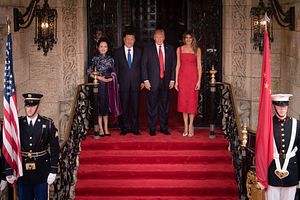On Wednesday, in an interview with the Wall Street Journal, U.S. President Donald J. Trump confirmed that his administration would not designate China a currency manipulator. Trump’s statement ends months of speculation that the U.S. Treasury Department would designate China a currency manipulator in its April report on the foreign exchange practices of various “major trading partners” of the United States. The report is expected to be released later this week.
Trump’s remarks come days after Chinese President Xi Jinping left the United States after his first face-to-face summit with Trump at the so-called Citrus Summit at Trump’s Mar-a-Lago estate in Florida. At the conclusion of that meeting, in comments to the press, U.S. Treasury Secretary Steve Mnuchin was non-committal on the question of declaring China a currency manipulator, simply telling the press that “the currency report is going to come out in the near future, and we will address that when it comes out.”
Trump’s thinking on the matter of Chinese foreign exchange practices appears to have evolved since his time on the campaign trail, when he repeatedly argued that China was artificially depressing its currency to benefit its exporters. In reality, since at least August 2015, China has been trying to prop up the value of the renminbi to stem capital flight and buttress domestic consumption.
In his remarks to the WSJ, Trump notes that he changed his mind because an adverse designation would affect U.S.-China cooperation on the threat posed by North Korea’s parallel nuclear and ballistic missile programs — an area where he has actively sought China’s cooperation. In fact, for Trump, unlike previous U.S. presidents, the economic and strategic agendas with China are linked unlike ever before.
For instance, Trump, at the Mar-a-Lago summit, told Xi that “a trade deal with the U.S. will be far better for them if they solve the North Korean problem.” Similarly, Trump perceives that withholding the designation of China as a currency manipulator may positively reinforce the acquiescence Xi demonstrated on North Korea at the summit and in a follow-up phone call the two leaders held on Tuesday evening.
Trump’s latest change of heart regarding China and the issue of currency manipulation suggests that he may be relying less on advisers like Peter Navarro, the head of his newly created National Trade Council. Navarro is perhaps the administration’s most vocal critic of Chinese foreign exchange and trade practices, along with Commerce Secretary Wilbur Ross and Chief Strategist Steve Bannon (another figure who appears increasingly marginalized in recent weeks).
Trump’s decision may ultimately suggest that the preferences of his son-in-law and senior adviser, Jared Kushner, and Gary Cohn, the director of the National Economic Council, are carrying more weight on China. Both Kushner and Cohn favor a more cordial economic relationship between China and the United States.
The administration’s decision to refrain from designating China a currency manipulator, however, does not guarantee that tension won’t lie ahead. One of the primary outcomes of the Trump-Xi summit was a 100-day plan whereby China would ostensibly move toward satisfying the Trump administration’s asks on “fair” trade. According to Ross at the conclusion of the summit, the benchmark of 100 days “might be ambitious,” but both sides would hit “way stations along the way.”

































